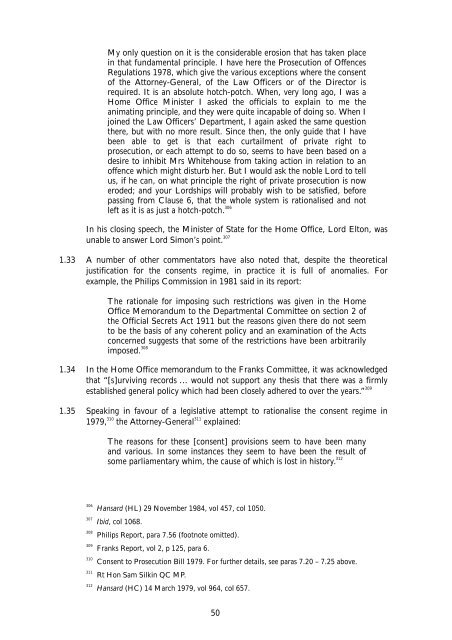cp149 Consents to Prosecution consultation - Law Commission
cp149 Consents to Prosecution consultation - Law Commission
cp149 Consents to Prosecution consultation - Law Commission
You also want an ePaper? Increase the reach of your titles
YUMPU automatically turns print PDFs into web optimized ePapers that Google loves.
My only question on it is the considerable erosion that has taken place<br />
in that fundamental principle. I have here the <strong>Prosecution</strong> of Offences<br />
Regulations 1978, which give the various exceptions where the consent<br />
of the At<strong>to</strong>rney-General, of the <strong>Law</strong> Officers or of the Direc<strong>to</strong>r is<br />
required. It is an absolute hotch-potch. When, very long ago, I was a<br />
Home Office Minister I asked the officials <strong>to</strong> explain <strong>to</strong> me the<br />
animating principle, and they were quite incapable of doing so. When I<br />
joined the <strong>Law</strong> Officers’ Department, I again asked the same question<br />
there, but with no more result. Since then, the only guide that I have<br />
been able <strong>to</strong> get is that each curtailment of private right <strong>to</strong><br />
prosecution, or each attempt <strong>to</strong> do so, seems <strong>to</strong> have been based on a<br />
desire <strong>to</strong> inhibit Mrs Whitehouse from taking action in relation <strong>to</strong> an<br />
offence which might disturb her. But I would ask the noble Lord <strong>to</strong> tell<br />
us, if he can, on what principle the right of private prosecution is now<br />
eroded; and your Lordships will probably wish <strong>to</strong> be satisfied, before<br />
passing from Clause 6, that the whole system is rationalised and not<br />
left as it is as just a hotch-potch. 306<br />
In his closing speech, the Minister of State for the Home Office, Lord El<strong>to</strong>n, was<br />
unable <strong>to</strong> answer Lord Simon’s point. 307<br />
1.33 A number of other commenta<strong>to</strong>rs have also noted that, despite the theoretical<br />
justification for the consents regime, in practice it is full of anomalies. For<br />
example, the Philips <strong>Commission</strong> in 1981 said in its report:<br />
The rationale for imposing such restrictions was given in the Home<br />
Office Memorandum <strong>to</strong> the Departmental Committee on section 2 of<br />
the Official Secrets Act 1911 but the reasons given there do not seem<br />
<strong>to</strong> be the basis of any coherent policy and an examination of the Acts<br />
concerned suggests that some of the restrictions have been arbitrarily<br />
imposed. 308<br />
1.34 In the Home Office memorandum <strong>to</strong> the Franks Committee, it was acknowledged<br />
that “[s]urviving records … would not support any thesis that there was a firmly<br />
established general policy which had been closely adhered <strong>to</strong> over the years.” 309<br />
1.35 Speaking in favour of a legislative attempt <strong>to</strong> rationalise the consent regime in<br />
1979, 310<br />
the At<strong>to</strong>rney-General 311<br />
explained:<br />
The reasons for these [consent] provisions seem <strong>to</strong> have been many<br />
and various. In some instances they seem <strong>to</strong> have been the result of<br />
some parliamentary whim, the cause of which is lost in his<strong>to</strong>ry. 312<br />
306 Hansard (HL) 29 November 1984, vol 457, col 1050.<br />
307 Ibid, col 1068.<br />
308 Philips Report, para 7.56 (footnote omitted).<br />
309 Franks Report, vol 2, p 125, para 6.<br />
310 Consent <strong>to</strong> <strong>Prosecution</strong> Bill 1979. For further details, see paras 7.20 – 7.25 above.<br />
311 Rt Hon Sam Silkin QC MP.<br />
312 Hansard (HC) 14 March 1979, vol 964, col 657.<br />
50
















